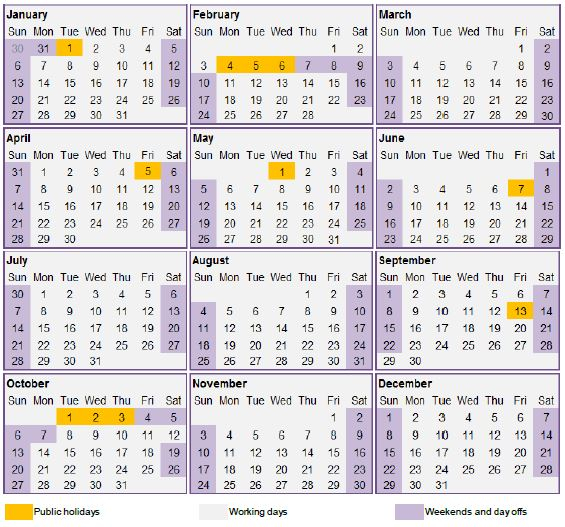
Legal Holidays 2019 in Mainland China: Impact for Companies
In Mainland China, holidays are based on 7 main celebrations as follows:
- New Year’s Day
- Spring Festival
- Tomb Sweeping Festival
- Labor Day
- Dragon Boat Festival
- Mid-Autumn Festival
- National Day
Legal Holidays Calender 2019 Mainland China
Companies are highly recommended to take into account the legal holidays (see below) when planning their activities. Please refer to the section “additional wage” below in case, the employer is not able to arrange the activities differently and requires the employees to work during public holidays.
Did you know?
Additional wages
The employee will receive additional wages in the following cases:
- 150% of normal wage should the employee be required to work more than 8h a day (40h a week) during weekdays;
- 200% of normal wage should the employee be required to work during weekends and no rest is arranged;
- 300% of normal wage should the employee be required to work during public holidays.
Special working hour system
Special working hour system may be put in place (e.g. flexible working hours) in order to cope with specific working situations but it needs to be approved by the relevant authorities.
For instance, under a flexible working hours system, employees are not subject to time limits (8h a day and 40h a week), and the employer is not obliged to remunerate overtime. Such flexible working hours system can only be put in place for certain categories of employees: i.e. management, salesperson, etc. and get specific approval from the labor bureau.
Issuance of the "National and Local Tax Collection and Administration System Reform Scheme”
Recently, the Office of the CPC Central Committee and General Office issued the "National and Local Tax Collection and Administration System Reform Scheme" (here after the "the Reform Scheme").
The Reform Scheme clarifies the basic principles and main objectives of the reform of the tax collection and administration of national tax and local tax, and puts forward the main tasks, implementation steps and supporting measures.
Highlights of the “Reform Scheme”
- From 1st January, 2019, the basic endowment insurance premiums, basic medical insurance premiums, unemployment insurance premiums, occupational injury insurance fees, maternity insurance fees and other social insurance premiums will be referred to the tax authorities for uniform collection instead of social insurance management department.
- The enterprises should pay the social insurance premiums according to the actual wage base, and the social insurance base shall be consistent with the taxable amount (as social insurance is collected by the tax bureau).





